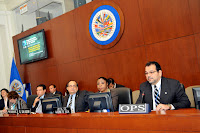QUESTIONING THE MAINSTREAM MEDIA’S COVERAGE OF VIOLENCE IN VENEZUELA
AS A REQUISITE FOR ACHIEVING NATIONAL
RECONCILIATION, THE OPPOSITION NEEDS TO ABANDON PROTESTS CONDUCIVE TO
CONFRONTATION AND DISRUPTIONS
From Venezuela
Dialogue: A Forum for Dialogue and Reflection
Any viable solution to the current crisis
in Venezuela cannot pass over the origins of the political violence that has
intensified over the recent past and now overshadows other national issues such
as economic problems and delinquency. The opposition and much of the media in
Venezuela and nearly all of the international media hold the government
exclusively responsible for the nearly one hundred resultant deaths. According
to this narrative the sequence that results in violence is unmistakable: first
peaceful marches followed by brutal government repression and then the reactive
excesses by a few belligerent break-away demonstrators. Those civilians who
engage in violent actions are sometimes labeled Chavistas or infiltrados, whose function is to
discredit the protests. Opposition political leaders, according to this
version, often attempt to reason with the few belligerent protestors to
convince them to desist from engaging in violence.
Ample evidence places in doubt the veracity
of this interpretation of what is happening on the ground. The facts point in a
different direction, namely that there is an articulation of various types of
protest:
1. The lines between the peaceful legal
protests, the peaceful illegal protests (such as the blocking of traffic) and the
violent protests are not clearly drawn. Actually, few of the protests are legal
since most involve blocking traffic sometimes by means of fires that extend
from one end of the street to the other. At what point does one type of protest
end and the other begin? At what point on the continuum can the protesters be
considered infiltrados?
2. Some opposition strategists talk of the “Ukrainian
manual” in which the combination of various types of protests succeeded in
toppling a government.
3. Most of the protests take place in
municipalities governed by the opposition; the municipal police force does
nothing to impede or attempt to control them.
4. The opposition repeatedly calls
“peaceful” marches that are bound to lead to violent confrontation. On numerous
occasions they call marches to reach downtown Caracas, knowing full well that
they will be forcefully blocked by the government out of fear of a repetition
of April 11, 2002, when such a protest erupted in violence leading to the
overthrow of Chávez. In recent days they have called for demonstrations in
front of Caracas’ Carlota air force base, even though it has been the target of
numerous attacks by hooded protesters, resulting in a number of casualties. The
predictability of violence in these cases would appear to shed light on the
opposition’s dubious intentions.
5. Some members of the opposition have
manifested a degree of intolerance and fanaticism that equals that of fringe
groups on the right in the United States and Europe. Their behavior and
expressions of hatred for the Chavistas can be gleaned from countless social
media posts as well as everyday conversations. Their attitudes lend credibility
to the claim that those protesters who engage in violence belong to the
opposition.
7. Another indication that violence is perpetrated
by members of the opposition and is not of an isolated nature is that it dates
back to the early years of Chávez’s rule and has been repeatedly employed. Incidents
of this nature occurred prior to the April 2002 coup, following the failed
general strike of 2002-2003 (including bomb explosions at the Colombian and
Spanish embassies in Caracas), an abortive paramilitary incursion in Caracas in
May 2005, following the announcement of the non-renewal of the television
concession for Radio Caracas in 2007, immediately following Maduro’s election
in 2013, and during the four months of “guarimba” in 2014. The notion that the
violence carried out by demonstrators is a spontaneous response to repression overlooks
the historical context.
By presenting the narrative that the opposition-perpetrated
violence is a spontaneous response to repression, the media (as well as the
hierarchy of the Catholic Church) is doing a disservice to the cause of national
reconciliation and stability while encouraging the radical currents of the
opposition.
For their part, President Maduro and other
top Chavista leaders have failed to persuasively clarify the relationship
between these different types of protest and instead they focus on the violence
perpetrated by the opposition. Little is said of the illegal nature of non-violent
protests that involve the blocking of traffic. Nor do Maduro and other Chavista
leaders emphatically explain why the marches are not allowed to reach downtown Caracas.
These shortcomings give credibility to the opposition’s narrative, specifically
its claim that a small fringe (possible consisting of infiltrados) is alone responsible for the street violence.
National reconciliation requires
concessions on both sides. Anti-government leaders, for their part, need to
explicitly repudiate the violence by recognizing the culpability of protesters
who are acting on behalf of the opposition. For this reason, they need to
modify their slogan of “liberation of political prisoners” to make clear that
they are not defending those who engage in violence. In addition, the opposition
needs to cease calling street protests that are conducive to confrontations,
disruptions and violence. Finally, the municipal governments controlled by the
opposition need to promote the coordination of efforts that include the local
police, the National Bolivarian Police and the National Guard not only to
counter violent protests, but peaceful illegal ones as well.
Venezuela Dialogue: A Forum for Dialogue and Reflection:
https://venezueladialogue.com/as-a-requisite-for-achieving-national-reconciliation-the-opposition-needs-to-abandon-protests-conducive-to-confrontation-and-disruptions/
Steve Ellner
Latin
American Perspectives




